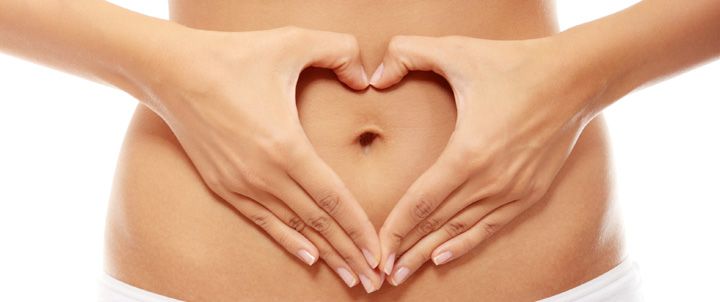
Give your gut a helping hand
4th September 2013 01:40 PM
Author: Charles Dunning
A blog from our brilliant Osteopath and Applied Kinesiologist Charles Dunning for your enjoyment!
I thought I would write a few lines about digestion and the digestive system as I`ve recently seen a number of both adults and children struggling with food and their digestive system, including bowel difficulties.
As children we were always told to chew our food properly and for a very good reason – digestion starts in the mouth with enzymes present in saliva. The more food is chewed and broken down the bigger the surface area available for enzymes to break down the food into individual molecules for absorption.
Stomach acid gets a bad reputation but is vital for breaking down proteins into amino acids and sterilising food – killing off bacteria/parasites etc. Frequently when people complain of acid reflux they are experiencing the effects of low pancreatic enzymes which are required to properly digest the constituents of food such as the proteins fats sugars carbohydrates as well as the cellulose in plant material.
If food is not properly broken down into the stomach and duodenum it cannot be absorbed in the small intestine properly. This incomplete digestion often leads to the familiar symptoms of gas and bloating due to fermentation in the small and large intestine.
Equally diarrhoea can occur because the body is struggling to cope with the digestive strain. Within the small intestine there are immune type cells that recognise foods as friend or foe through a system called the lectin system. Frequently food allergies and food sensitivities are aggravated by both poor digestion and absorption.
Certain supplements can be very helpful if you are struggling with your digestion. Often pancreatic enzymes are useful when taken with food to optimise digestion. Glutamine is an amino acid taken as a powder dissolved in food or liquid generally 5 grams a day which helps to fuel the cells in the gut aiding repair and helping to prevent “leaky gut syndrome” where partially digested foods pass from the gut into the bloodstream and create various allergic symptoms. Probiotics such as acidophilus have long been recognised as beneficial in helping to keep the nasty bacteria that often proliferate in check. Probiotic yoghurts are useful but avoid the ones high in sugar as sugars will feed the bad bacteria further creating candida overgrowth.
In terms of diet avoiding too much gluten, sugar, processed foods and animal proteins is helpful in giving the gut a “rest”. Eating small regular meals is less taxing to the digestive system and helps to stabilise blood sugar and craving sweet foods. Equally important is eating more whole grains and brown rice etc as they are more nutritious than the bleached white alternatives where a lot of the minerals such as magnesium have been removed.
An unhappy gut can cause us so many problems so maybe it is time to listen to yours and work out what it needs in order to be happy again?
The views expressed in these blogs are those of the blog authors and do not necessarily reflect the views of The Bridge Centre for Natural Health.
Looking For a Particular Treatment?
View the full range of treatments that the Bridge Centre provide.
Recent Posts
- Technical Issues Update 03/04/24
- Technical Issues - March 24
- Z is for ZZZZ
- Y is for You
- Surviving the Autumn / Winter with Five...
- W is for Where is The Bridge Centre
Tags
- Acupuncture,
- Hypnotherapy,
- Osteopathy,
- Massage,
- Pilates,
- Reflexology,
- Fertility,
- Stress,
- wellbeing,
- counselling,
- emotional freedom technique,
- Pregnancy,
- EFT,
- self care,
- Mindfulness,
- Sleep,
- Nutritional Therapy,
- talking therapies,
- Reiki,
- mental health,
- Exercise,
- Relaxation,
- New Year,
- EMMETT Technique,
- Fertility Acupuncture,
- ,
- Grief,
- Bereavement,
- Nutrition,
- Moxibustion,
- Five Elements,
- Sperm,
- Infertility,
- Stop Smoking,
- Meditation,
- Insomnia,
- Anxiety,
- Fibromyalgia,
- Pain,
- carers,
- Deep Tissue Massage,
- back pain,
- Pregnancy Massage,
- Lymphatic Drainage,
- Solution focussed hypnotherapy,
- Hypno-Reiki,
- Cranial Osteopathy,
- detox,
- Digestion,
- Katy Henry,
- Christmas,
- colds,
- immune system,
- Rheumatoid Arthritis,
- Mid life crisis,
- Angelic Reiki,
- Katy Henry Unlimited,
- The Bridge Centre for Natural Health,
- erection,
- Nausea,
- exam stress,
- exams,
- PCOS,
- Runners,
- samantha farmer,
- Winter Health,
- Coughs,
- Caroline Challender,
- K Tape,
- fitness wellbeing,
- sports recovery,
- acute pain,
- chronic pain,
- recovery,
- Sex,
- young carers,
- Sports Massage,
- Hopi Ear Candles,
- Osteopath,
- back care,
- travelling,
- travel,
- Musculoskeletal,
- menopause,
- Diet,
- Hayfever,
- Fitness,
- Pelvic Girdle Pain,
- PGP,
- Resolutions,
- Contact Us,
- smoking cessation,
- Weight management,
- free consults,
- paediatric acupuncture,
- gift vouchers,
- Joint Pain,
- Chinese medicine,
- Qi,
- Cognitive Behavioural Therapy,
- visiting the Centre,
- Depression,


01332 521270